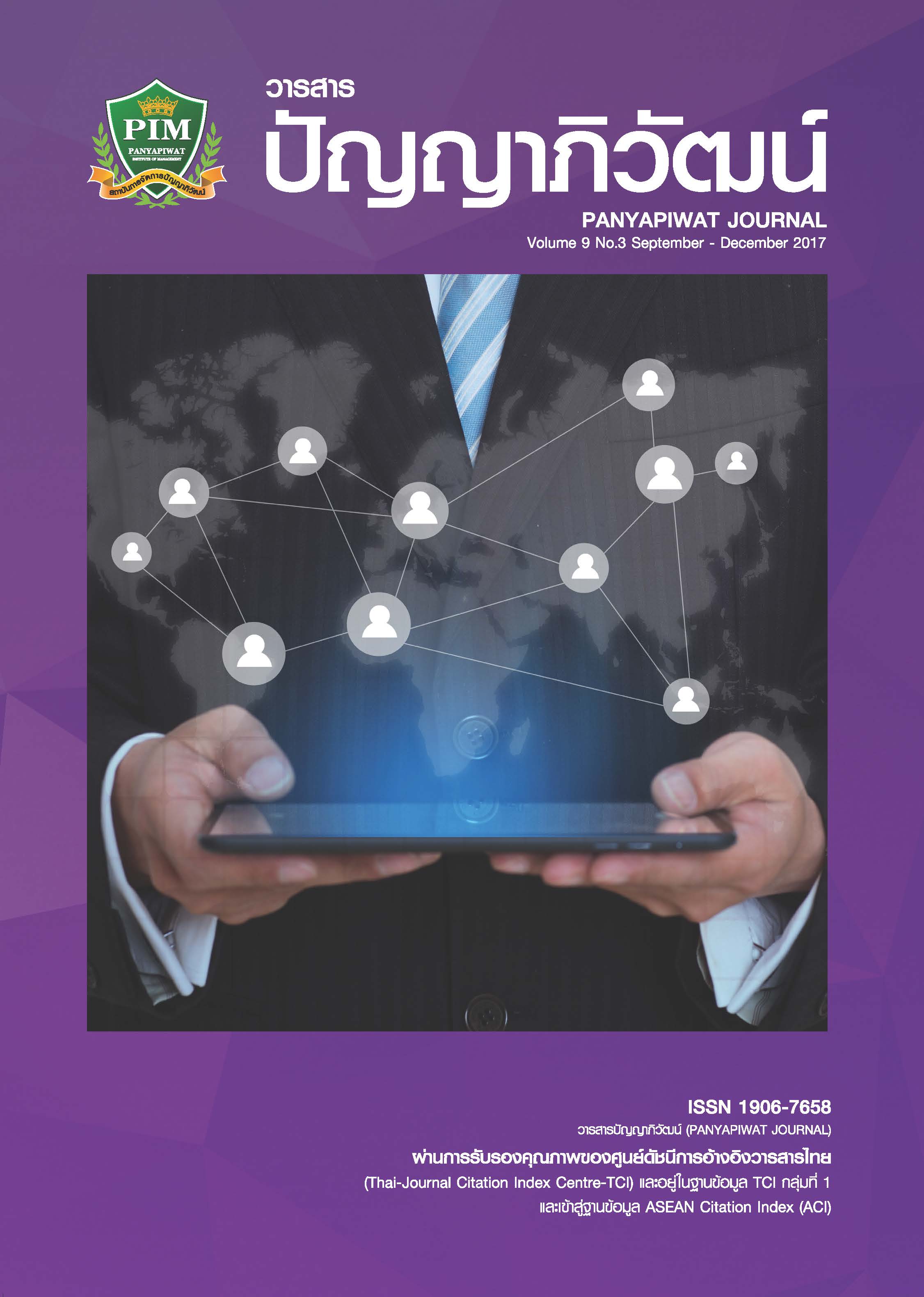ประเด็นและความท้าทายในงานด้านทรัพยากรมนุษย์สำหรับธุรกิจระหว่างประเทศ
Main Article Content
บทคัดย่อ
บทความนี้วัตถุประสงค์เพื่อนำเสนอความสำคัญของประเด็นและความท้าทายที่เกี่ยวข้องกับการกำหนดนโยบายและแนวปฏิบัติในด้านการจัดการทรัพยากรมนุษย์ระหว่างประเทศภายใต้กระแสแห่งการเปลี่ยนแปลงในปัจจุบันของโลกไร้พรมแดน ซึ่งประกอบด้วยการคัดเลือกและการมอบหมายงาน การฝึกอบรมและการพัฒนาความก้าวหน้าในอาชีพ การจ่ายค่าตอบแทน การเตรียมความพร้อมสำหรับบุคลากรข้ามชาติเมื่อถูกส่งตัวกลับ รวมถึงประเด็นจริยธรรม ความรับผิดชอบต่อสังคม เพื่อความยั่งยืนของธุรกิจ ธุรกิจที่มีการดำเนินงานในต่างประเทศต้องเผชิญกับสภาพแวดล้อมทางธุรกิจที่แตกต่างอย่างมาก ทั้งด้านภาษา กฎระเบียบข้อบังคับ สภาพเศรษฐกิจ สังคมและวัฒนธรรม ดังนั้นองค์กรจำเป็นต้องมุ่งเน้นการจัดการทรัพยากรมนุษย์ในระดับโลกและการจัดการข้ามวัฒนธรรม เพื่อเพิ่มประสิทธิภาพในการทำงานและความสำเร็จขององค์กร
The aim of this article is to describe that International human resource management and implementation has become one of the most importance issues for international business during fast moving globalization world in the present days. The challenges associated with international human resource management consists of selection and assignment, training and career development, compensation, repatriation management, ethics and corporate social responsibility for sustainable business. When companies set up in foreign countries, they may adjust their practices to meet substantial differences in environments for doing business in language, law and regulations, economic and sociocultural factors. Consequently, the organizations need to develop global HRM and focus on cross-cultural management for enhancing organizational performance and success.
Article Details
“ข้าพเจ้าและผู้เขียนร่วม (ถ้ามี) ขอรับรองว่า บทความที่เสนอมานี้ยังไม่เคยได้รับการตีพิมพ์และไม่ได้อยู่ระหว่างกระบวนการพิจารณาลงตีพิมพ์ในวารสารหรือแหล่งเผยแพร่อื่นใด ข้าพเจ้าและผู้เขียนร่วมยอมรับหลักเกณฑ์การพิจารณาต้นฉบับ ทั้งยินยอมให้กองบรรณาธิการมีสิทธิ์พิจารณาและตรวจแก้ต้นฉบับได้ตามที่เห็นสมควร พร้อมนี้ขอมอบลิขสิทธิ์บทความที่ได้รับการตีพิมพ์ให้แก่สถาบันการจัดการปัญญาภิวัฒน์หากมีการฟ้องร้องเรื่องการละเมิดลิขสิทธิ์เกี่ยวกับภาพ กราฟ ข้อความส่วนใดส่วนหนึ่งและ/หรือข้อคิดเห็นที่ปรากฏในบทความข้าพเจ้าและผู้เขียนร่วมยินยอมรับผิดชอบแต่เพียงฝ่ายเดียว”
เอกสารอ้างอิง
Aguinis, H. & Kraiger, K. (2009). Benefits of training and development for individuals and teams, organization and society. Annual Review of Psychology, 60, 451-474.
Albinger, H. & Freeman, S. (2000). Corporate social performance and attractiveness as an employer to different job seeking populations. Journal of Business Ethics, 28(3), 243-253.
Baron, D. P. (2001). Private policies, corporate social responsibility, and integrated strategy. Journal of Economics and Management Strategy, 10(1), 7-45.
Brammer, S., Millington, A. & Rayton, B. (2007). The contribution of corporate social responsibility to organizational commitment. Retrieved January 26, 2016, from https://www.bath.ac.uk/management/research/pdf/2005-20.pdf
Cacioppe, R., Forster, N. & Fox, M. (2008). A survey of managers’ perceptions of corporate ethics and social responsibility and actions that may affect companies’ success. Journal of Business Ethics, 82(3), 681-700.
Carroll, A. (1991). The pyramid of corporate social responsibility: toward the moral management of organizational stakeholders. Business Horizons, 34(4), 39-48.
Colling, D. G., Scullion, H. & Morley, M. J. (2007). Changing pattern of global staffing in the multinational enterprise: challenges to the conventional expatriate assignment and emerging alternatives. Journal of World Business, 42(2), 198-213.
Darawong, C. (2013). Expatriate management for the era of ASEAN free trade. Journal of Business Administration, 36(138), 28-39. [in Thai]
Fatimah, S. & Surienty, L. (2013). You are kind, you are smart, you are Important: the linkages between individual factors and the intention to repatriate among malaysianself-initiated expatriates. Journal of Social and Development Sciences, 4(11), 498-507.
Grant, R. M. (1991). The resource-based theory of competitive advantage: Implications for strategy formulation. California Management Review, 33(Spring), 114-135.
Harvey, M., Noricevic, M. M. & Speier, C. (2000). Strategic global human resource management the role of inpatriate managers. Human Resource Management Review, 10(2), 153-175.
Harzing, A. & Pinnington, A. H. (2015). International human resource management (4th ed.). London: SAGE Publications.
Hiransomboon, K. (2004). International business management. Bangkok: Text and Journal. [in Thai]
Honda Workers’ Union of Thailand. (2014). Welfare and benefits. Retrieved March 13, 2016, from https://www/hondaunion.org [in Thai]
Jain, H., Mathew, M. & Bedi, A. (2012). HRM innovations by Indian and foreign MNCs operating in India: asurvey of HR professionals. The International Journal of Human Resource Management, 23(5), 1006-1018.
Jaworek, M. & Kuzel, M. (2015). Transnational corporations in the world economy: formation, development and present position. Copernican Journal of Finance &Accounting, 4(1), 55-70.
Kongchan, A. (2014). Human resource management. Bangkok: Parp Pim. [in Thai]
Passakonjaras, S. (2008). Principles of international business management. Bangkok: McGraw Hill Education. [in Thai]
Pudelko, M. & Harzing, A. (2007). Country-of-origin, localization, or dominance effect? An empirical investigation of HRM practices in foreign subsidiaries. Human Resource Management, 46(4), 535-559.
Roozen, I., Pelsmacker, P. & Bostyn, F. (2001). The ethical dimensions of decision process of Employees. Journal of Business Ethics, 33(2), 87-100.
Sean, V. & Gary, F. (2008). Ethics programs, perceived corporate social responsibility and job satisfaction. Journal of Business Ethics, 77(2), 159-172.
Sonmanee, K. (2016). Human resources management amid globalization. Panyapiwat Journal, 8(1), 275-287. [in Thai]
Tahvanainen, M., Welch, D. & Worm, V. (2005). Implications of short-term international assignments. European Management Journal, 23(6), 663-673.
Tharenou, P. & Caulfield, N. (2010). Will I say or will I go? Explaining repatriate by self-initiated expatriates. Academy of Management Journal, 53(5), 1009-1028.
Tung, R. L. (1981). Selection and training of personnel for overseas assignments. ColumbiaJournal of World Business, 16(2), 68-78.
United Nations Conference on Trade and Development. (2015). World investment report reforming international investment governance overview. Retrieved January 26, 2016, from https://unctad.org/en/PublicationsLibrary/wir2015_en.pdf
Vidal-Salazar, M. D., Hurtado-Torres, N. E. & Matias-Reche, F. (2012). Training as a generator of employee capabilities. International Journal of Human Resource Management, 23(13), 2680-2697.


